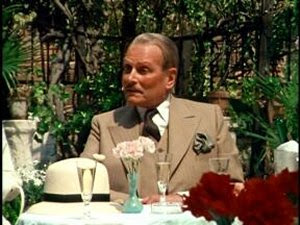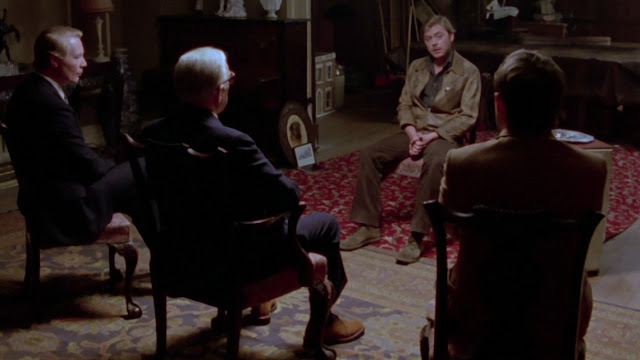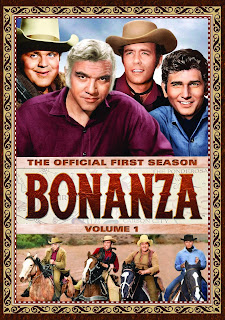Some Classic TV Adaptations for Long Winter Nights
We have - at last - bought a new DVD player (yes, they do still exist, presumably solely for dinosaurs like me...), so I have been looking through some of my old favourites, and I've realised that the ones I watch most often are old TV series rather than films. One reason for this is that we tend to eat far too late, so don't sit down till after 9, by which time an hour's viewing is about all I can cope with. But it's also very enjoyable to revisit what are often real gems from a heyday of broadcasting. The standard of some current and recent series - Line of Duty, Bodyguard, Vanity Fair to name a few - is of course extremely high, but I still enjoy re-watching past glories.
Here are some of my rediscovered favourites:
The Jewel in the Crown
'This is the story of a rape..of the events that led up to it and followed it and of the place in which it happened. '
This adaptation of Paul Scott's famous Raj Quartet dates from 1984. Filmed largely on location in India, it covers the last days of British rule through the story of a doomed love affair and its consequences, mirroring perhaps the love affair that the British had with India. The scenery is spectacular, the acting superlative, the plot strands gripping.
 |
| Guy Perron (Charles Dance), Ronald Merrick (Tim Piggot-Smith), Hari Kumar (Art Malik) and Rachel Kempson (Lady Manners): image - JustWatch |
Art Malik as Hari Kumar, the doomed son of an Indian businessman who, after being educated at an English public school, has to return to India when his father dies a bankrupt, broke many a schoolgirl's adoring heart. Charles Dance as the dashing, honourable Guy Perron (one of the few 'nice' characters that Dance has ever played - he is just so good at being evil), was also extremely popular. Geraldine James was a wonderful Sarah Layton, and Wendy Morgan was even better as her mentally disintegrating sister Susan. Judy Parfitt, as Sarah and Susan's frustrated, bored, casually unkind mother Mildred, was unforgettable. Susan Wooldridge was exactly the Daphne Manners I had imagined, and Dame Peggy Ashcroft brought so much depth and tragedy to the unworldy, insecure, missionary Barbara Batchelor, showing us just how fragile the position of the 'companion' could be.
 |
| Peggy Ashcroft and Geraldine James |
The star of the show, however, must surely be the late Tim Piggot-Smith, who played the complex, cruel, repressed grammar school boy Ronald Merrick with unparalled skill and understanding.
What a series this was.
A Dance to the Music of Time
Sometimes TV adaptations of books one has loved can be terrible disappointments. Occasionally, though, they are perfect, and A Dance to the Music of Time (Channel 4, 1997) was just that.
Anthony Powell's twelve volume sequence of novels follows a group of mainly upper-middle-class characters from the 1920s to the early 70s. It is narrated by Nicholas Jenkins, and many of the main players are initially his contemporaries at School (ie Eton, though it is not named) and/or Oxford. Jenkins, Charles Stringham and Peter Templer form the nucleus of the group, but the most important, and most enigmatic, character is their fellow pupil Kenneth Widmerpool, who unlike them is neither rich nor smooth, Widmerpool is initially ridiculed by his more affluent, assured peers, but becomes increasingly powerful and sinister as the years pass. There is, of course, a huge cast of supporting characters, and frequent reference to real events, but our main interest is always in the 'dancers.'
 |
| Charles Stringham (Paul Rhys), Sillery (Alan Bennett), St John Clarke (John Geilgud) and Nicholas Jenkins (James Purefoy) |
In the TV adaptation, Widmerpool is played by the unutterably brilliant Simon Russell Beale. It is still hard to imagine anyone else in the role, so well did he inhabit it. Paul Rhys is also excellent as the nervy, alcoholic, unreliable Stringham, the sight of whom being carried off in a truck to a Japanese POW camp is one of the most moving scenes in the series. Another very memorable character is the beautiful, disturbed and extremely badly behaved Pamela Flitton, who eventually becomes Widmerpool's wife. Miranda Richardson conveys the subversive Pamela's brittle, careless - and frequently dangerous - persona very well indeed.
 |
| Kenneth Widmerpool (Simon Russell Beale) |
When I read the books, I remember having to keep a dictionary by my side, so esoteric were many of Powell's words (jolie laide anyone?). The TV series does, of course, have to prune the novels down to four parts, but it also makes the books much more accessible and I loved every minute of it.
Brideshead Revisited
Most people will have seen this superlative adaptation (Granada Television, 1981) of Evelyn Waugh's novel at some point. I have since watched it several times and never failed to enjoy it. Jeremy Irons is Charles Ryder, the middle class boy taken up by the aristocratic, privileged Sebastian Flyte (an unforgettable Anthony Andrews), who introduces him to his eccentric family, their palatial home at Brideshead, and their world of affluence and High Catholicism.
As the years pass (the story begins at Oxford in 1922 and ends with Charles's return to a deserted, requisitioned, Brideshead in 1943) Charles becomes an artist, marries, has an affair with Sebastian's sister Julia, and, as war becomes inevitable, joins the army. Sebastian, now a seriously ill alcoholic, is living in Morocco with Kurt, a German ex-soldier.
 |
| Cordelia (Phoebe Nicholls) |
Although Irons and Andrews are justifiably remembered as the outstanding stars of this series, Claire Bloom also excelled as Sebastian's mother, the obsessively devout and somewhat remote Lady Marchmain, and Phoebe Nicholls was also very good indeed as his younger sister, the equally devout but somewhat more human Cordelia.
 |
| Lord Marchmain (Sir Laurence Olivier) |
Sir Laurence Olivier is wonderful as Lord Marchmain, who has left the family and lives with his mistress Cara in Venice. When Sebastian and Charles visit the (both geographically and religiously) exiled couple at Lord Marchmain's palazzo and fling open the shutters above the Grand Canal (where else?) in all its glory, Venice naturally becomes a star in its own right. Lord Marchmain's deathbed return to Brideshead and more importantly (at least so far as Waugh is concerned) to the Catholic Church, are also exceptional scenes.
The book was turned into a film in 2008, and unlike many people I did enjoy it, though I thought it would have been improved by sharper editing; it was too long by at least half an hour. Michael Gambon and Felicity Jones as Lord Marchmain and Cordelia provided the film's best performances. Nothing, however, can compare to the TV series, which remains eminently watchable and a classic of its kind.
Tales of the City
 |
| Mary Ann Singleton (Laura Linney) |
The estimable Laura Linney plays Mary Ann Singleton, the naive secretary from Ohio who comes to the city for a holiday and decides to stay. Through her we meet the wonderful, mysterious Mrs Madrigal, landlady and mother confessor of the Barbary Lane boarding house. Mrs Madrigal, who for most of us will forever be the fabulous Olivia Dukakis, lives in the ground floor apartment and floats about all day in flowing robes. In the courtyard she tends plants of a rather exotic nature; when Mary Ann moves in she finds an unusual welcome taped to her door. The other residents include Mona Ramsay, Michael Tulliver ('Mouse') and Norman Williams, a very creepy man who lives in a kind of studio on the roof.
 |
| Mouse (Marcus D'Amico), Mary Ann (Laura Linney) and Mona Ramsay (Chloe Webb) |
Mary Ann gets a job working for Edgar Halycon, owner of an advertising agency, and thus becomes embroiled with his horrible son-in-law Beauchamp and Beauchamp's wife DeDe. And so it goes on. In those days at least, San Francisco was a village, and it's no surprise that the Scottish writer Alexander McCall Smith was inspired by a meeting with Maupin to write his own take on the village that is Edinburgh - 44 Scotland Street and its many sequels.
 |
| Anna Madrigal (Olympia Dukakis) |
The series is so well acted, and the episodes so full of cliffhangers (quite literally at one point...) that it's an irresistible watch. In a 2005 article in Entertainment Weekly, Gary Susman described it as;
'a time capsule that treats its characters with humor, respect, and a sexual frankness... that was uncommon for PBS in 1993 and would be politically impossible there today.'
I've seen Tales of the City many times and am always happy to see it again. It may be of another time and another place, but the characters are nuanced, interesting, and full of surprises. You can't but come away from it thinking what a time that must have been to be young and alive in that city of cities.
Tinker, Tailor, Soldier, Spy
People of a certain age may well remember waiting impatiently for each episode of this classic adaptation of John Le Carre's famous novel, in which retired spy George Smiley is brought back to seek out the mole in the inner sanctum of the Circus (the British Secret Intelligence Service.) This was 1979, so we were a long way from catch-up or even DVDs. You needed to be there for each instalment, and you needed to concentrate, because if you missed a vital plot point there was no chance of pause and replay....
 |
| Rikki Tarr (Hywel Bennett) ia questioned |
Le Carre's book is so perfect that readers may have wondered how the BBC would fare in adapting it. They need not have worried - Alec Guinness as the quiet, polite, unassuming (but brilliant) Smiley gives an unmatchable performance and carries every scene, ably assisted by Bernard Hepton as Toby Esterhase, Michael Jayston as Smiley's protegee Peter Guillam, Ian Richardson as Bill Haydon, the much missed Ian Bannen as ill-fated spy Jim Prideaux, and Hywel Bennett - for once properly used in a serious role - as maverick spy Ricki Tarr. I remember at the time being taken aback by the appearance of Beryl Reid as the unhappily retired, alcoholic, genius Connie Sachs; I had never seen Reid (nor Bennett for that matter) outside comedy before, and my did she excel in this role - in her hands, Sachs became a truly tragic figure.
 |
| Toby Esterhase (Bernard Hepton), Bill Haydon (Ian Richardson), Percy Alleline (Michael Aldridge) and Roy Bland (Terence Rigby) |
I recently watched the DVD (BBC 2003) of this series. It was just as good as it ever had been, but what particularly struck me this time was how very shabby London looked. Smiley, for example, lives in a what is supposed to be a smart house (possibly in Pimlico?) but to our modern eyes even that looks 'ripe for renovation.' How times change, and how little we notice them changing.
This is said to be John Le Carre's favourite adaptation of his work. He and Alec Guinness met often to discuss the character, and at Guinness's request Le Carre even introduced him to a real spy, Sir Maurice Oldfield, while Guinness was researching the role.
In 2011 a new film adaptation was made, with Gary Oldman as Smiley. Much as I love the 1979 version, I have to say that I also very much enjoyed Oldman's performance, and have rewatched this version more than once. Toby Jones was extremely good as Percy Alleline, and Benedict Cumberbatch brought real depth to the role of Peter Guillam. And Kathy Burke was almost - almost - as good as Beryl Reid had been in her interprepation of Connie. Nevertheless, the original TV series is still very much worth watching, the duller colours and smaller sets perhaps adding to its evocation of the Cold War era and the scandals surrounding the defection of Guy Burgess and Kim Philby (which, when the novel was first published, were still very fresh in the minds of the British public.)
There are so many more old series that I have dug up over the past months; honourable mentions should go to The No.1 Ladies' Detective Agency (why didn't they make any more of these lovely adaptations? Jill Scott and Anila Noni Rose were perfect as Mma Ramotswe Mma Makutsi, and the Botswanan scenery was spectacular), Love in a Cold Climate, Bleak House (in which, incidentally, Charles Dance reverted to his speciality as the manipulative, scheming Mr Tulkinghorn) and even Dallas. And if I had them, I think I'd probably still enjoy those old cowboy series I used to watch with my grandmother - The Virginian, The Big Valley and Bonanza would all bring back memories of her Saturday afternoon visits.











I agree, it is the old TV series that I too remember and wish to watch repeatedly. I remember Jewel in the Crown and for a moment wondered whether you were going to mention Tim Piggot-Smith because Ronal Merrick is after all the dark shadow behind all that glitter of the Raj. Remember reading a book also that Piggot-Smith wrote about his experience of India while shooting the serial.
ReplyDeleteThe series that I most remember are 3 German detective ones: Old Fox, Derrick, and The Investigator; the American Star Trek TOS, which remains the only Star Trek for me; the English one called The Bretts; and the BBC- Australian one called Bodyline. In fact typing all this has made me nostalgic about the time when we used to get quality TV.
What you've featured here - and it's quite odd - is all the series I've never watched but wish I had. Seriously. I think it's because my tastes have changed so much over the years that what didn't interest me 30 or 40 years ago now does. My husband's tastes had an impact years ago too, I tended to give in if he wasn't interested (I think this is quite common in women) whereas these days I record those things on the Humax box and watch on dismal winter afternoon while I knit my scarves and he's elsewhere. I fancy Tinker, Tailor, Soldier, Spy is now on Netflix so I'll search that out as Peter probably would want to watch that.
ReplyDeleteWe're currently recording all of the old Morses on ITV3 and watching those, and enjoying Inspector Montalbano on iPlayer. I keep recommending this to people who try it but are put off by the subtitles. I'm not fond but after the first few it becomes excellent and the Sicilian scenery is wonderful. I think it's made by a Swedish TV company. I read a newspaper article comparing the insanity of Montalbano to the Scandi noir series that are shown with their long ponderous silences and introspection. Hilarious. Personally I haven't watched much of the Scandi and as some tend towards the psychologically frightening and that's not my thing.
It's a crying shame that no more Ladies' Detective Agency episodes were made. I thought they were lovely. I feel the same about ITV's Maigret which they just suddenly cancelled. And yes to The Virginian and all the other TV westerns I loved to bits. We watched them all, my favourites as a child were Laramie and Wagon Train, as I got older, The Virginian, High Chapparal, Lancer.
Fun post, Rosemary.